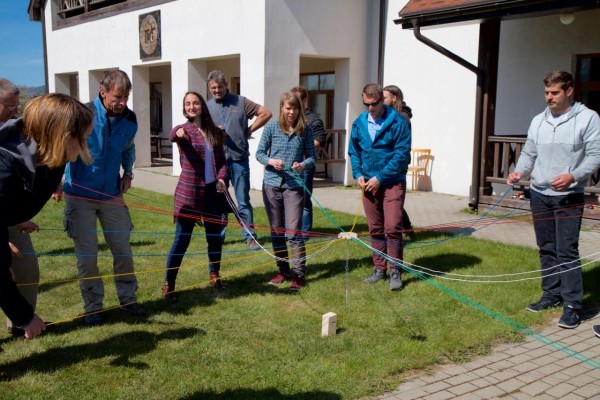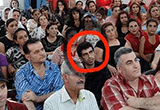
Alaa and his wife Walaa are experiencing the economic effects of the Syrian Civil War. With a one-year-old child, Alaa bears the weight of providing for his family as the sole income earner. Working in a garden and earning a measly $50 USD, Alaa felt the constant pressures, and felt depressed knowing that what he was earning was not enough to feed his family. This led Alaa to have suicidal thoughts.
When Alaa met our Syrian partners in Sweida, they invited him to attend the church to receive a Bag of Blessing (a bag distributed monthly by our partners, with essential food and non-food items). When Alaa came to the church and shared his story, our partners made an intentional visit to his family where they saw his situation first hand. The poverty that Alaa’s family lived in was so glaring and undeniable that it shocked our partners.
They spent quality time with the family, who come from a Druze background. Sharing about God’s love and how He does not forget His people, Alaa and Walaa were both touched by the message, deciding soon after to commit their lives to following Jesus.
As Alaa and Walaa walked our Syrian partners back to their car after the visit, they were surprised when they were gifted with a Bag of Blessing. Tears of joy escaped their eyes, thanking the Lord and the church for this blessing that would help alleviate some of their financial burdens each month.
WOULD YOU LIKE TO PROVIDE A BAG OF BLESSING TO A DISPLACED FAMILY IN SYRIA? YOU COULD HELP PROVIDE ESSENTIAL FOOD AND NON-FOOD ITEMS TO THOSE WHO ARE HURTING.
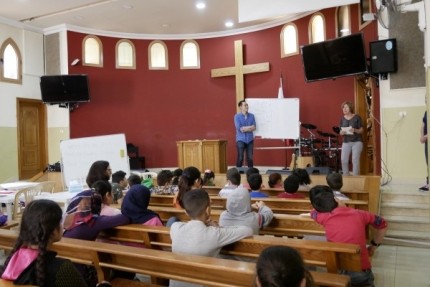
As a supporter of Global Aid Network (GAiN)’s Syrian Refugee Relief program, Raphael knew that he wanted to meet GAiN’s partners in the Middle East, see the work being done in the field and also get involved in a more tangible way. A LIFE Team trip to Lebanon with GAiN was the perfect way to do all of these things.
The trip lasted for two weeks in May, giving the team enough time to serve alongside local in-country partners in a variety of different ways.
Having met GAiN’s Syrian partner at a Syria fundraiser in Toronto, Raphael already had a good understanding of the project, having heard stories about lives that were being impacted by the Bags of Blessings program. So when he decided to go on the trip to Lebanon, he expected to meet the local partners as well as refugees. What he didn’t know was that his expectations would be exceeded.
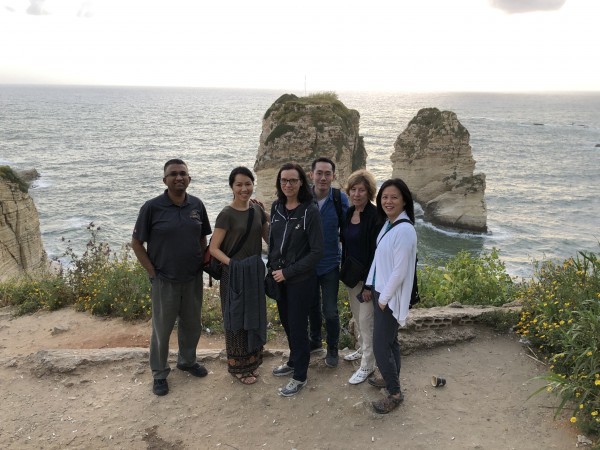
“We met a lot of local partners who had such big hearts for people in Lebanon [and] Syria and loved these people [with] actions, beyond what we could comprehend,” Raphael said. “It was very humbling to see how they were lifting His name through their services to refugees.”
The team, made up of three other participants, had the chance to meet with six volunteers from Syria who work with GAiN’s Syrian partners in the field. The volunteers shared about the work that is being done in Damascus, the economic hardships of local displaced families, as well as share some of their own personal testimonies.
Overall, the team was able to hear firsthand accounts of life in Syria, and was humbled to hear about the incredible ways that God is changing lives in the midst of a crisis.
“Witnessing the sacrificial and incomprehensible love of the local partners in their ministries was the most astonishing aspect of being on the field,” Raphael expressed. “Similarly, the sheer incomprehensibility of what it means to go through what these refugees went through was weighing on my mind on the field.”
For the rest of the trip, the team spent most of their days at a local church in Beirut, where they helped tutor and teach children from refugee families who have no access to public education. Some members of the team had the opportunity to lead chapel, which included songs, games and Bible lessons.
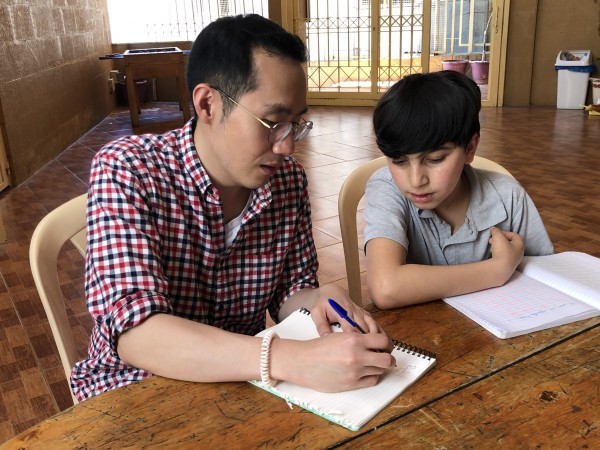
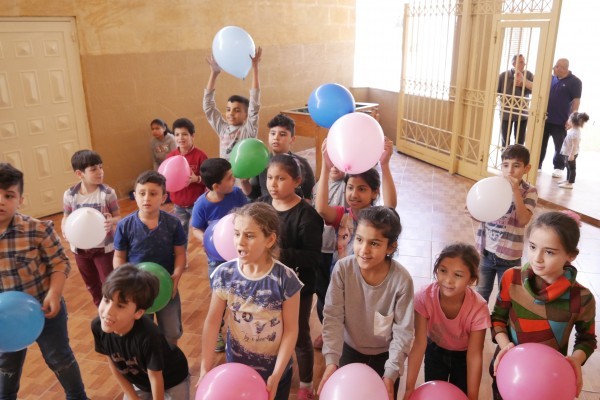
“I think playing with the refugee children, teaching them English, and leading chapel services were the most tangible demonstration of God’s love. [The kids] were so excited to be with us from day one. As we spent most of our time serving at the school, we could build relationships with the children individually.”
They also had the opportunity to visit the homes of two families of some of the children, spending quality time with them. Unfortunately, due to the timing of the trip being around Ramadan, the team was only able to visit two families, so as not to disturb those families who might have been observing the Muslim holiday. However, Raphael felt that the two family visits they did do was worthwhile and that the families were deeply touched.
“I felt the family visit was a very personal and tangible demonstration of love we could offer to these refugee families.”
Another highlight of the trip was volunteering at a medical clinic that was hosted by the church. Refugees were welcome to come in to get checked by a doctor and were given a diagnosis and free medication as needed. The team was able to help in different roles, such as triaging patients, taking medical history and vital signs, dispensing medication, praying for patients and spending time with kids who came with their moms to be at the clinic.
Other days were spent helping sort clothing items at the local partner’s used clothing store, which sells clothes and other items at a discounted price to refugee families in need. One day, they went to a large storage warehouse and helped distribute food and household items to refugees from Iraq and Syria and ended up handing out 81 bags, providing families with much-needed essentials.
For Raphael, all of these opportunities to be present and serve refugees has made a significant impact on his life.
“I witnessed that it is possible to serve God and people so boldly as these local partners do. It will be my struggle to live out the same spirit in my own context and place. The trip has helped me to better grasp the interconnectedness of the supporters on the other side of the world and the local staff and partners on the field. In other words, I tangibly experienced that all followers of Christ do, indeed, belong to one body. In places where I never visited and barely thought of, the Spirit was working so powerfully and mightily, and continually will. With these experiences, not only in my financial giving, but also in my prayers, it has become more global.”
ARE YOU INTERESTED IN GOING ON A LIFE TEAM TRIP IN 2020? VIEW OUR UPCOMING TRIPS TO SEE IF THERE IS A TRIP FOR YOU.
SEE MORE
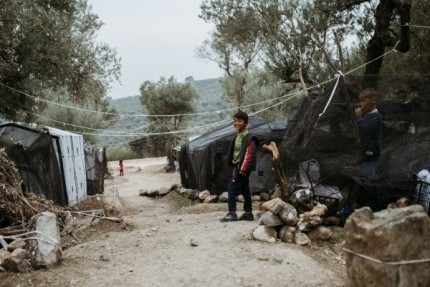
In October 2018, Lily, LIFE Teams Manager for Global Aid Network Canada, volunteered at a refugee camp called Camp Moria in Lesbos, Greece with GAiN Switzerland (in partnership with EuroRelief). She wrote of her experiences and how she was deeply impacted by the stories of the people she encountered.
DAVID
I met David on my first day at Camp Moria. That first day was overwhelming and I was trying to quickly process all that was happening. During a rest break, I sat on the benches near the info centre wanting a quiet moment to myself. A skinny boy with a big grin came up and greeted me.
“Hello!” He spoke broken English but was eager to practice. We struck up a conversation and we were glad for each other’s company. David, who’s 12 years old, and his family (parents and younger brother) have recently arrived in Moria from Afghanistan (via stops in Iraq and Turkey).
As our conversation continued, David said, “I don’t like Moria. I want to leave but they told us that we may have to wait a year.” As he said those words, David’s eyes welled up with tears and he quickly turned away, feeling embarrassed by the betrayal of emotions. I pretended not to notice. In my mind, I kept thinking that David is my little son’s age. That broke my heart.
Over the next few days, David made a point to come and find me at the volunteer area each day. On the third day, I visited his mom and brother in their shelter box. I was glad I had some tea and almonds from home to bring as gifts. We shared stories and smiles over tea time. The visit was sweet and lighthearted and bought some normalcy to a place that’s far from normal. When my time in Moria was wrapping up, I couldn’t bear to say goodbye to David. I still regret that decision but truthfully, it was because I didn’t have the courage to face the unfair fact that I can leave Moria whenever I wanted while his future remained hung in balance.
ALI
On my last night at Camp Moria, I had the task of guarding the gates of the “Unaccompanied Minors” section. There are minors (18 and under) who make the journey to Greece alone. These boys, who are considered a vulnerable population, are housed in a separate gated section of camp. The entrance to this section is guarded throughout the day and locked at midnight each day.
My last job before leaving was guard duty for this section from 8pm to midnight. I didn’t prepare for the cold weather as I wasn’t expecting to be working so late at camp. I wore 4 layers of clothing and still felt cold. I couldn’t imagine what it was like for those who slept in tents night after night.
While on duty, one teenage boy, Ali, started hanging out near the entrance with me. At first it was more curiosity, since many that I encountered at the camp were in disbelief that someone who looked like me (Chinese) was from Canada. Ali spoke relatively decent English and he helped me screen the boys who were trying to sneak into the section illegally to see friends.
Ali is from Afghanistan and left home alone, two years ago, in search of a better life. He first travelled to Iraq and then Turkey where he worked for about one-anda-half years doing odd jobs for cash, which he sent home to his family.
Ali showed me photos of his brothers, sisters and parents. About four months ago, he decided to make the dangerous trek across the Aegean sea from Turkey to Greece, hoping for yet another better future. He’s been at Moria ever since.
I asked him how old he was and he replied, “Sixteen.” Right away, I thought of my own 16 year-old son at home and I couldn’t bear the thought of someone like my son being alone at a place like Moria. No 16 year-old should feel he has to put himself in this dangerous position for a better life, to bear this type of burden. It’s just not right.
I turned my face away in the dark so he couldn’t see the tears I was fighting back. He didn’t need to see that. We kept chatting and I shared my snacks with him. When my shift was ending and it was time for me to leave, my motherly instinct kicked in. I said to Ali, “Be safe and stay away from the crazy people at camp. Practice your English and study when you can so that when you leave Moria, you will be ready.” He smiled, nodded and then we said goodbye.
I still think about these boys occasionally. As I contemplate about returning to Moria, I wonder if they are still there. I hope not. I hope they have been able to move on from Moria and found the better future that they are seeking.
Are you interested in volunteering at Camp Moria? Join us on an upcoming LIFE Team impact trip to Lesbos, Greece.
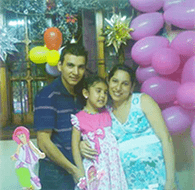
Pastor Daniel married his wife Nancy in 2006. A year after their wedding, Camila was born. She was a joy to her parents and shared her father’s passion for music.
At the end of 2012, a medical diagnosis indicated that Camila, only four years old, had a brain tumor. The results of the studies were not encouraging; the doctors said they could not operate on Camila and that there was nothing they could do. The tumor continued to grow and Camila’s health deteriorated rapidly. Everything was delivered into the hands of God, praying and waiting for His will.
In February 2013, Camila, now five years old, told her father, “Dad, I am going to go with Jesus.” Ten days after, Camila passed away, leaving her parents to deal with the pain of losing a daughter.
Two years later, Pastor Daniel moved his family to the city of Itauguá, Paraguay, with the desire to impact their community. They began to pray for direction. Camila’s words echoed in his mind and heart until he finally understood that if his five-year-old daughter was sure that she would be in heaven with Jesus after she passed away, then the children of the neighborhood could also have the same sense of security. This assured Pastor Daniel that working with the children would not be a waste of time.
It was then that, they learned about the support that Jesus Responde, Global Aid Network (GAiN)’s partner in Paraguay, was providing through the wholistic community centres. These community centres, all throughout Paraguay, invite children from families who are living in poverty and crisis to gather weekly. They come for a nutritious meal and various activities, such as sports and games, educational tutoring, and spiritual care (songs and Biblical teaching through AWANA, a children’s discipleship program). In some cases, some community centres host vocational trainings for parents of the children.
Hearing about the impact of these community centres filled Pastor Daniel and his wife with so much joy and hope that they decided to open their own community centre in partnership with Jesus Responde. They called it La Semilla.
Today, Pastor Daniel tells us how children get excited when they receive a nutritious meal, as many of them do not eat breakfast or eat at home. La Semilla has helped Daniel and his family fulfill their call and teach these children about Jesus.
WOULD YOU LIKE TO INVEST IN A WHOLISTIC COMMUNITY CENTRE IN PARAGUAY? YOU COULD MAKE A DIFFERENCE IN THE PHYSICAL, SPIRITUAL AND SOCIAL HEALTH OF CHILDREN LIVING IN POVERTY.
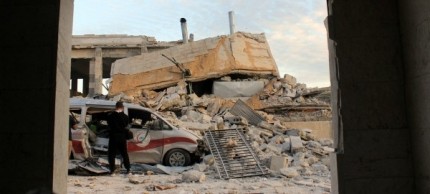
The heads of 11 global humanitarian organizations warned on Thursday that the embattled rebel-held province of Idlib in Syria, stands on the brink of disaster, with three million civilian lives at risk, including one million children.
In a direct video address to launch a worldwide campaign in solidarity with civilians trapped there, dubbed #TheWorldIsWatching, the humanitarian leaders said that they face the constant threat of violence. “Too many have died already” and “even wars have laws” they declared, in the face of multiple attacks by Government forces and their allies on hospitals, schools and markets, together with fierce resistance from extremist fighters that have gained control of much of the territory.
“Idlib is on the brink of a humanitarian nightmare unlike anything we have seen this century”, they warn.
UN relief chief and Humanitarian Coordinator, Mark Lowcock, said that “our worst fears are materializing…Yet again innocent civilians are paying the price for the political failure to stop the violence and do what is demanded under international law – to protect all civilians.
A huge influx of civilians – many displaced by fighting during urban offensives in places such as Aleppo and eastern Ghouta – has seen the northwestern Governorate double in population since 2015.
At least 330,000 have been forced to seek shelter elsewhere within the region, during the huge uptick in violence of the past two months. Many of them have nowhere left to run.
“Our campaign expresses solidarity with the families under attack and tells everyone that we are watching and witnessing what is happening”, said OCHA chief Lowcock.
‘Universal principles and values must prevail’: Rochdi
With more than 300 civilians have been killed in the so-called de-escalation area in northwestern Syria since the latest Government offensive, including many women and children, said the Senior Humanitarian Adviser on Syria, Najat Rochdi.
During a Syria Humanitarian Taskforce meeting in Geneva on Thursday, she noted the ambulance that had been hit by aerial bombardment just last week, and the death of three medical workers, who had been attempting to rescue a female patient who also died, while they were trying to reach a local hospital.
“Everything needs to be done to protect civilians”, she said. “Universal principles and values must prevail when so many innocent lives are at stake.”
In Rukban camp on the Jordanian border, she said around 27,000 displaced civilians still lacked the most basic services, in dire need of assistance. “We continue to call for humanitarian access to Rukban to be able to deliver life-saving aid and to assist those who would like to leave”, she added.
UN envoy urges Russia and Turkey to ‘stablize’ Idlib
The UN Special Envoy for Syria, on Thursday urged the Security Council to “work at the highest level to stabilize the situation in Idleb” as the guarantors of the de-confliction zone in and around Idlib, set up last September.
Gier Pedersen told the Council that both countries “have reassured me that they remain committed” to the Memorandum of Understanding and had set up a working group.
“We must see this assurance reflected on the ground” said the Envoy, adding that he hoped Syria would be a main item for discussion at this weekend’s G20 Summit of nations, taking place in Japan.
“We hope that Russia and the United States can build on recent talks and deepen their dialogue at the highest level too”, he said, noting that five international armies were still present in war-torn Syria, making the need for a nationwide ceasefire critical.
Mr. Pedersen also highlighted the “significant presence” of terrorist group, Hayat Tahrir al-Sham inside the de-escalation area as another major drawback: “Its attacks must cease. But all due protection must be afforded to the up to three million civilians in Idlib.
“Undoubtedly, there is no easy solution for Idlib. But the only way to find one, is for hostilities to stop, and for key stakeholders to engage in a cooperative approach towards countering terrorism – an approach that safeguards the protection of civilians.”
GAIN IS WORKING IN SYRIA, ALONGSIDE LOCAL PARTNERS, TO HELP BRING HOPE THROUGH AID (BAGS OF BLESSINGS).
CLICK HERE FOR MORE INFORMATION AND/OR TO SUPPORT THE PROJECT.
Source: https://news.un.org/en/story/2019/06/1041471
Photo Source: UNICEF/Khalil Ashawi
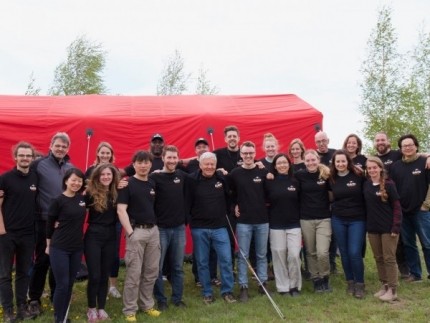
For Tess Mawson, doing a Global Aid Network (GAiN) DART (Disaster Assistance Response Team) training was an obvious step in her ministry and career in the humanitarian sector.
“I really love practical ways of serving people that are truly in their most desperate place. Often one of the strategies of GAiN DART teams is to reach people that are kind of on the outside, or have been left behind, or neglected by other organizations, or in situations where nobody else is reaching them,” Tess explained.
“There’s a value to reaching out to the lost and left behind. It is such a valuable way to show the love of God. I love getting to use my practical God-given skills in problem solving and hard work and leadership and all these different things and getting to use these to reach people.”
DART is a GAiN Worldwide initiative, that responds in the event of a disaster by deploying teams of certified volunteers to the field. Teams provide aid such as food and non-food items, water, medical support, emergency shelter and trauma healing.
Every two years GAiN puts on a training, designed and organized by GAiN Germany, in order to equip and prepare trainees for real-life disaster response on the field. This year, the eight day training program was led by four GAiN Germany staff and one GAiN Canada staff. Twenty trainees from 10 different countries, including six Canadians, took part. The participants came from diverse backgrounds, ranging in age (early 20s to 70s), differing in careers (finance, medicine, business, humanitarian aid, etc.) and varying in culture.
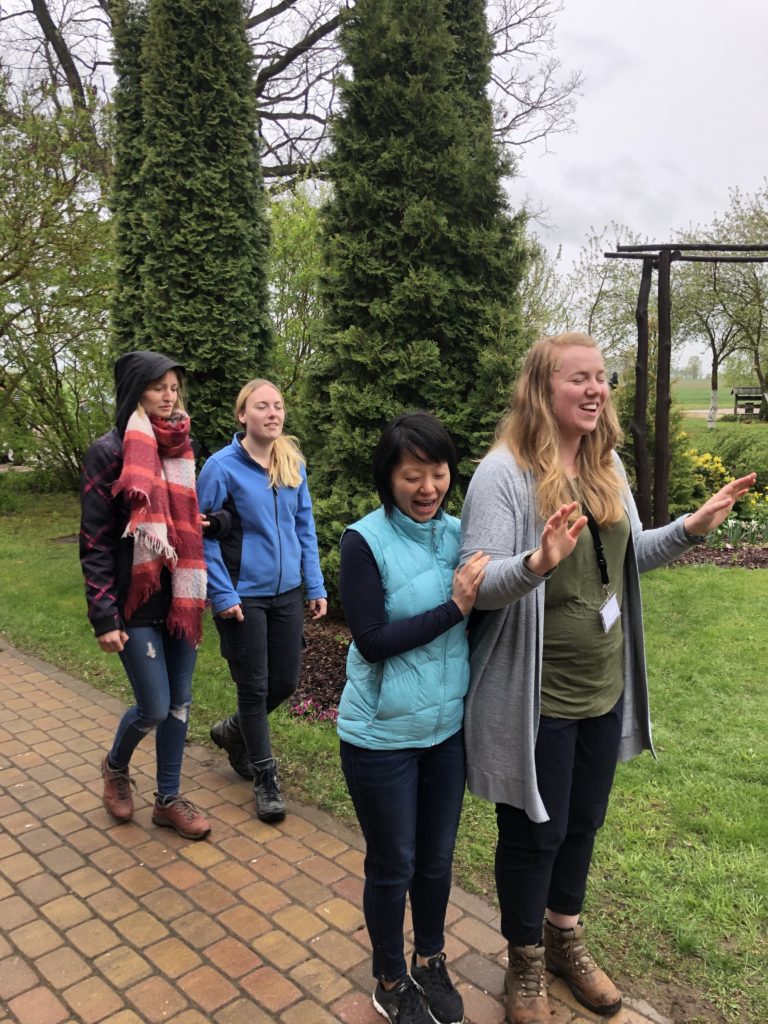
About half of the days were focused on classroom theory, where trainees learned about specific roles and responsibilities required for every DART team. Other sessions included topics on leadership, the history of humanitarian aid, conflict resolution, as well as safety and security.
The other half of the days consisted of a practical exercise that lasted multiple days. Trainees were put into teams, navigating a simulated disaster situation and getting the opportunity to practice being on a DART team. Trainees were tested to see how they would respond to possible scenarios and potential issues that may arise on any DART mission.
The program is designed to challenge, push and stretch participants. For Tess, she completed the program with a better sense of herself and learned more about leadership, teamwork and humanitarian aid.
“In my terms, [I call the training] the pressure cooker for character. You’re definitely operating in these intense situations and you’re not sleeping and you’re working hard. You’re really stretched, yet you have to work as a team and care for people and love people well. It really pushes you to know your limits and your capacity and to know when you need to stop and when you can push forward and when you need to rely on your team for work. [There were a lot] of really valuable lessons for team work.”
Besides learning a lot about her strengths, weaknesses and capabilities, one of Tess’s biggest takeaways was the humanness of humanitarian aid.
“We [often] think that it’s about the logistics and what’s being distributed and what’s being done or the aid that’s being brought, but it’s actually so much more about the person that is receiving the aid. It’s about meeting people where they are in their suffering and in their pain and caring for them and seeing them and being with them. That has so much of an impact, more than an item of food or clothing could.”
If you have a heart for reaching the lost, hurting and forgotten, don’t let the challenging aspects of the training discourage you from applying, Tess said.
“Don’t make a decision based on your qualifications and your skills and experiences but on your desire to serve in that way. I would recommend DART to anybody who has a heart to meet people in very broken situations and who is willing to sacrifice comfort and ease to reach those people. It does help if you love problem solving and have an interest in humanitarian aid and those kinds of things but it’s really open for everybody. It’s open for everybody but it’s not for everybody because it’s hard. It does require a certain stamina to be able to do it.”
IF YOU WOULD LIKE MORE INFORMATION, CLICK HERE TO EMAIL US.
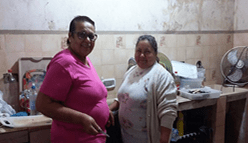
Mrs. Clotilde Haedo (pictured on the right), 57 years old, is a hardworking mother of seven, currently living with two of her kids in Isla Bogado, Paraguay, in the neighborhood of Luque. She has faithfully attended the National Marathon of Prayer, an event organized annually by Global Aid Network (GAiN)’s Paraguayan partner Jesús Responde, since 2010.
In August 2012, a young volunteer from Jesús Responde met with Clotilde and shared stories of impact from the Jesús Responde wholistic community centres and invited Clotilde to partner with them as a donor. She accepted the invitation and committed to giving 20,000 Guaranies ($4.36 CAD).
True to her word, Clotilde gave the agreed amount each month.
Unfortunately, as time passed, her family experienced a financial crisis, causing her to, with great sorrow in her heart, renounce the commitment that she had made.
In September 2017, the pastor, of Clotilde’s church, Pastor Cleibel Peixoto, challenged the members of his congregation to start a wholistic community centre. Although she was hesitant at first, Clotilde agreed to be one of the cooks. In that moment, she remembered the commitment she had made and could not fulfill years ago. Clotilde saw this as a new opportunity that came from God. He was calling her once again to serve.
By the end of 2017, the wholistic community centres had served the community successfully and the number of children in attendance increased. Upon hearing this, a representative of Jesús Responde en Luque told them of the support given to the churches that work with children.
On February 13, 2018, Pastor Cleibel presented his application and shortly thereafter began to work in partnership with the institution.
On June 3 of that same year, Mrs. Clotilde confirmed during a volunteer day, once again, the call for her life. “I thank God for showing me, after thirty years (in the way of the Lord), the ministry that He had kept for me,” she told us, with tears in her eyes.
Today she serves with joy and faithfulness at the community centre, loving and caring for the children. The children have praised her, saying that they do not even eat a meal made with as much affection in their homes.
YOU CAN HELP BRING WHOLISTIC NUTRITION TO IMPOVERISHED CHILDREN IN PARAGUAY. WILL YOU HELP SUPPORT A WHOLISTIC COMMUNITY CENTRE?
GIVE TODAY
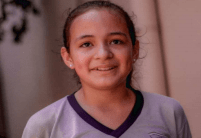
Telma is 12 years old and lives with her mother Liz, her grandmother Esperanza and her sister Sara. For the majority of her life she has been under the care of her grandmother because her mother was absent. When her mother wasn’t working she would spend her free time with friends, attending parties or other participating in other activities outside of the house.
Grandmother Esperanza already knew about Jesus and was a regular church attendee. Her church runs a wholistic community centre with Global Aid Network (GAiN)’s Paraguayan partner Jesus Responde. At these community centres, children from impoverished backgrounds are invited to attend weekly, where they receive a nutritious meal, play games with other kids, and learn about Jesus through the AWANA program.
Telma was two years old when her grandmother brought her and her sister Sara to a wholistic community centre. It was there that she was taught about Jesus and his love. Every morning, Telma and Sara would pray to God that Liz (their mother) would come to know Jesus.
Eventually, after years of praying, their mother decided to accompany Telma and Sara to church. It was in one of the meetings that she got to know Jesus. Now, the whole family attends church together. Recently, Grandmother Esperanza lost her eyesight but continues to attend church meetings, thanks to perseverance and the help of Telma who is an active church participant.
Telma shares, “Jesus transformed my family. In my house there is more peace and more joy. Sara and I now receive the attention and affection from our mother that we did not have when we were younger. We are grateful because every day we are taken care of, loved and get to learn about God.”
WOULD YOU LIKE TO SUPPORT A WHOLISTIC COMMUNITY CENTRE IN PARAGUAY?
GIVE TODAY
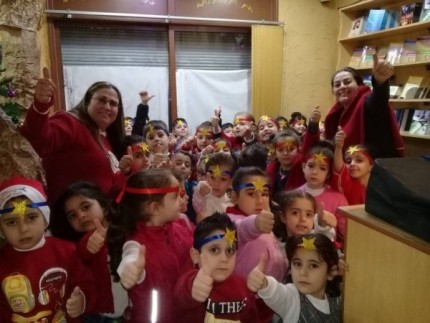
Another year has passed since the Syrian Civil War started in 2011 and the country remains unstable. Our partners on the ground are still working faithfully to bring hope and physical aid where needed most. They continue to meet with displaced families, the majority of whom have experienced trauma and are living in poverty as a result of the war.
In December, our partners distributed clothing (sweaters, jackets, dresses) to 523 displaced children whose families could not afford to get them Christmas gifts. One thousand Bags of Blessings (bags with essential food and non-food items that provide for a family of five for one month) were distributed to the children’s families, which helped to alleviate their monthly expenses.
The clothes and Bags of Blessings were a huge help to many families who were in need of not just aid and hope, but community and love in the midst of war and uncertainty. Here are three families who had received gifts:
Jan’s father is in the army, his mother has no work and his brother is just three months old. Jan’s mother told our partners that receiving the Bag of Blessing helped her cover a large part of what would have been her expenses for the month. In the bag there was halawa (a Syrian dessert), which Jan loved.
When Jan received the Christmas gift (sweater) at the distribution, he was very happy and excited to wear it. Jan’s mother said they were very thankful for this gift as there had been no money to buy things for him, since most of the money went toward the baby and rent.
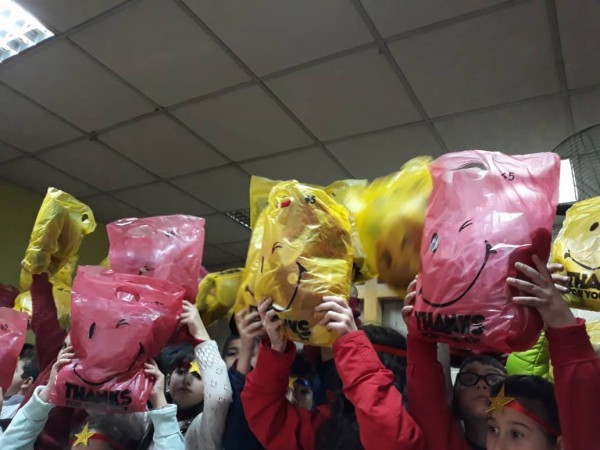
Kalven and Elvin are siblings. Their mother does not work and their father works sporadically, except for in the winter when there is no work available.
For a short period of time, Kalven and Elvin came to the centre. Last month the family took a Bag of Blessing, which helped them out tremendously. The mother said that she would buy half a kilo of rice for cooking. And, due to the high cost of sugar in Syria, she could not afford to buy any sweets at the market. But, with the Bag of Blessing, she received rice, oil, pasta and sugar. The children were delighted because they love pasta and halawa.
The family was also pleased with the Christmas gifts they received. The mother explained that she was unable to buy Christmas dresses for her children due to the market price being too high. So, they were thrilled to receive these dresses as gifts at the distribution.
Tim, Shahab and Nabih attended the centre where Christmas distributions were happening. Their father, who is physically disabled and in a wheelchair, works at a vegetable shop. Their mother does not work; instead, she stays at home and helps the children study.
The children’s father mentioned that he had not been thinking about buying Christmas clothes because they had just given their children hand-me-downs from their relatives. When they received the Christmas gift of clothes, they were thrilled.
Upon receiving the Bag of Blessing, the mother cried and explained that she had not seen this amount of food in a long time. The boys loved the many different pastas and the rice. The family happily reported that now the children are always full and satisfied.
WOULD YOU LIKE TO BRING HOPE TO DISPLACED SYRIANS IN THE FORM OF A BAG OF BLESSING?
GIVE TODAY
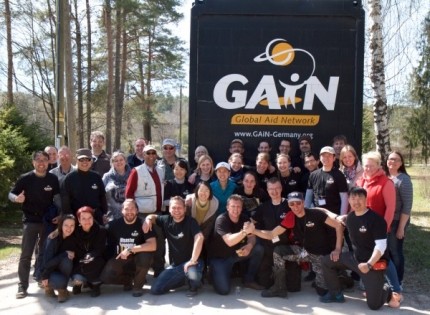
When participating in a DART (Disaster Assistance Response Team) mission you need to work through any physical, mental and emotional challenges that may arise — and that’s just what DART training is for.
DART responds in the event of a disaster (natural or man-made) providing food, water, medical support, emergency shelter and trauma healing with the perspective of long-term aid. Volunteers are required to be ready to leave for a disaster area for at least two weeks, but preferably four weeks to three months.
In May 2017, Canadians participants, including one GAiN Canada staff member, took part in DART training that took place in Riga, Latvia for eight days.
The training program was organized by GAiN Germany, where trainees were put through real-life simulated situations to mimic specific problems that would present themselves on a DART mission. Sleeping in tents in freezing temperatures with little sleep only intensified the challenges, truly testing the participants’ ability to respond under pressure. All of the real-life simulated situations gave participants a glimpse of what participating in a DART mission might entail.
“It is amazing and it’s hard,” expressed Monique Lieuwen, Relief and Development project manager for GAiN and DART training participant. “Your emotions [go up and down] at any given minute. [Sometimes you think], ‘it’s so awesome,’ [and other times], ‘wow, what am I doing?’ But overall it is incredible.”
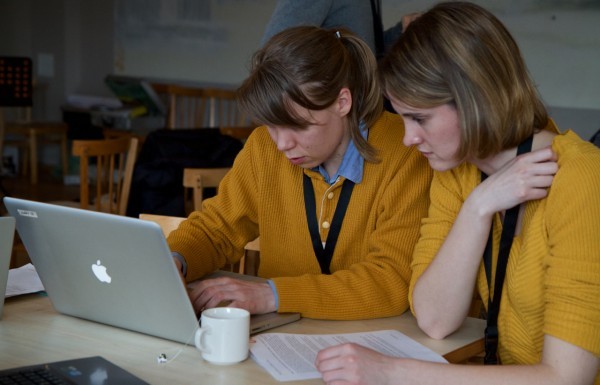
The training was valuable and Lieuwen returned to Canada having learned many things. One of the most significant lessons she learned was the importance of teamwork, especially in disaster situations.
“One thing that was really evident, because DART has a lot of strong personalities, was teamwork and the importance of submitting to the leader. You don’t have time to ask questions, you just do it. There were moments we worked really well together and there were moments we should have just trusted the leader and we didn’t. In a disaster context everything is amplified.”
While a DART member needs to be strong, both physically and mentally, Lieuwen also learned that a team requires a variety of people with different skill sets. DART looks for volunteers with skills in leadership, communication, finances, medical care, technology, spiritual guidance, construction and more.
“If people think they’re not qualified, I think they need to think outside the box a little bit. Because even at first I thought, ‘What do I have to offer?’ And at the end I was like, ‘I can do this, this, this and this. A lot of people just think it is physical strength and you do need physical strength because you will do physical tasks but there’s more.”
But the DART training experience wasn’t just challenges. Lieuwen was grateful to meet 19 other participants from six different countries: Canada, Australia, Germany, Finland, Netherlands and Korea.
“It’s awesome to meet people from all those different places with the same faith and the same passions. One thing I love is before we went to the practical exercises we had time for praise and worship and so everyone is singing in their own language, the same song. I love it. It’s a little glimpse of heaven.”
